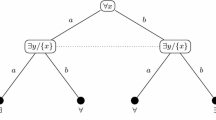Abstract
We associate the semantic game with chance moves conceived by Blinov with Blamey’s partial logic. We give some equivalent alternatives to the semantic game, some of which are with a third player, borrowing the idea of introducing the pseudo-player called Nature in game theory. We observe that IF propositional logic proposed by Sandu and Pietarinen can be equivalently translated to partial logic, which implies that imperfect information may not be necessary for IF propositional logic. We also indicate that some independent quantifiers can be regarded as dependent quantifiers of indeterminate sequence, using the interjunction connective in partial logic. We conclude our paper by indicating some further research in a more general setting.
Similar content being viewed by others
References
Abramsky S., Jagadeesan R. (1994) Games and full completeness for multiplicative linear logic. Journal of Symbolic Logic 59(2): 543–574
Blamey, S. (1980). Partial valued logic. Ph.D thesis. Oxford University.
Blamey S. (2002) Partial logic. In: Gabbay D. M., Guenthner F. (eds) Handbook of philosophical logic. 2nd edn. Springer, Heidelberg, pp 261–353
Blinov A. (1994) Semantic games with chance moves. Synthese 99(3): 311–327
Bonanno G. (2001) Branching time logic, perfect information games and backward induction. Games and Economic Behavior 36(1): 57–73
Harsanyi J. C. (1967) Games with incomplete information played by ‘Bayesian’ players. Management Science 14(3): 159–182
Hintikka J. (1996) The principles of mathematics revisited. Cambridge University Press, Cambridge
Hintikka J., Sandu G. (1997) Game-theoretic semantics. In: van Benthem J., ter Meulen A. (eds) Handbook of logic and language. Elsevier, Amsterdam, pp 361–410
Hodges W. (1997) Compositional semantics for a language of imperfect information. Logic Journal of the IGPL 5(4): 539–563
Kleene S. C. (1938) On a notation for ordinal numbers. Journal of Symbolic Logic 3: 150–155
Parikh R. (1985) The logic of games and its applications. Annals of Discrete Mathematics 24: 111–140
Pietarinen A.-V. (2001) Propositional logic of imperfect information: Foundations and applications. Notre Dame Journal of Formal Logic 42(4): 193–210
Pietarinen A.-V. (2006) Independence-friendly logic and games of incomplete information. In: van Benthem J. (eds) The age of alternative logics. Springer, Dordrecht, pp 243–259
Rasmusen E. (2007) Games and information: An introduction to game theory. 4th edn. Wiley, New York
Sandu G. (1993) On the logic of informational independence and its applications. Journal of Philosophical Logic 22(1): 29–60
Sandu G., Pietarinen A.-V. (2001) Partiality and games: Propositional logic. Logic Journal of the IGPL 9(1): 101–121
Sandu G., Pietarinen A. (2003) Informationally independent connectives. In: Mints G., Muskens R. (eds) Logic, language and computation. Stanford, CSLI, pp 23–41
Tulenheimo, T. (2004). Independence-friendly modal logic. PhD. Thesis, University of Helsinki.
Väänänen J. (2002) On the semantics of informational independence. Logic Journal of the IGPL 10(3): 339–352
Väänänen J. (2007) Dependence logic: A new approach to independence friendly logic. Cambridge University Press, Cambridge
van Benthem J. (1999–2002) Logic in games, electronic lecture notes. University of Amsterdam & Department of Philosophy, ILLC
van Benthem J. (2001) Games in dynamic epistemic logic. Bulletin of Economic Research 53(4): 219–248
van Benthem, J. (2004). Probabilistic features in logic games. In J. Symons & D. Kolak (Eds.), Quantifiers, questions and quantum physics (pp. 189–194). Springer.
van Benthem J. (2005) Open problems in logic and games. We Will Show Them! 1: 229–264
van Benthem, J. (2006). The epistemic logic of IF games. In The philosophy of Jaakko Hintikka (pp. 481–513). Chicago: Open Court Publishers.
van Benthem J. (2008) Games that make sense: Logic, language and multi-agent interaction. In: Apt K., van Rooij R. (eds) New perspectives on games and interaction. Amsterdam University Press, Amsterdam, pp 197–209
Author information
Authors and Affiliations
Corresponding author
Rights and permissions
About this article
Cite this article
Wen, X., Ju, S. Semantic games with chance moves revisited: from IF logic to partial logic. Synthese 190, 1605–1620 (2013). https://doi.org/10.1007/s11229-011-9897-5
Received:
Accepted:
Published:
Issue Date:
DOI: https://doi.org/10.1007/s11229-011-9897-5




